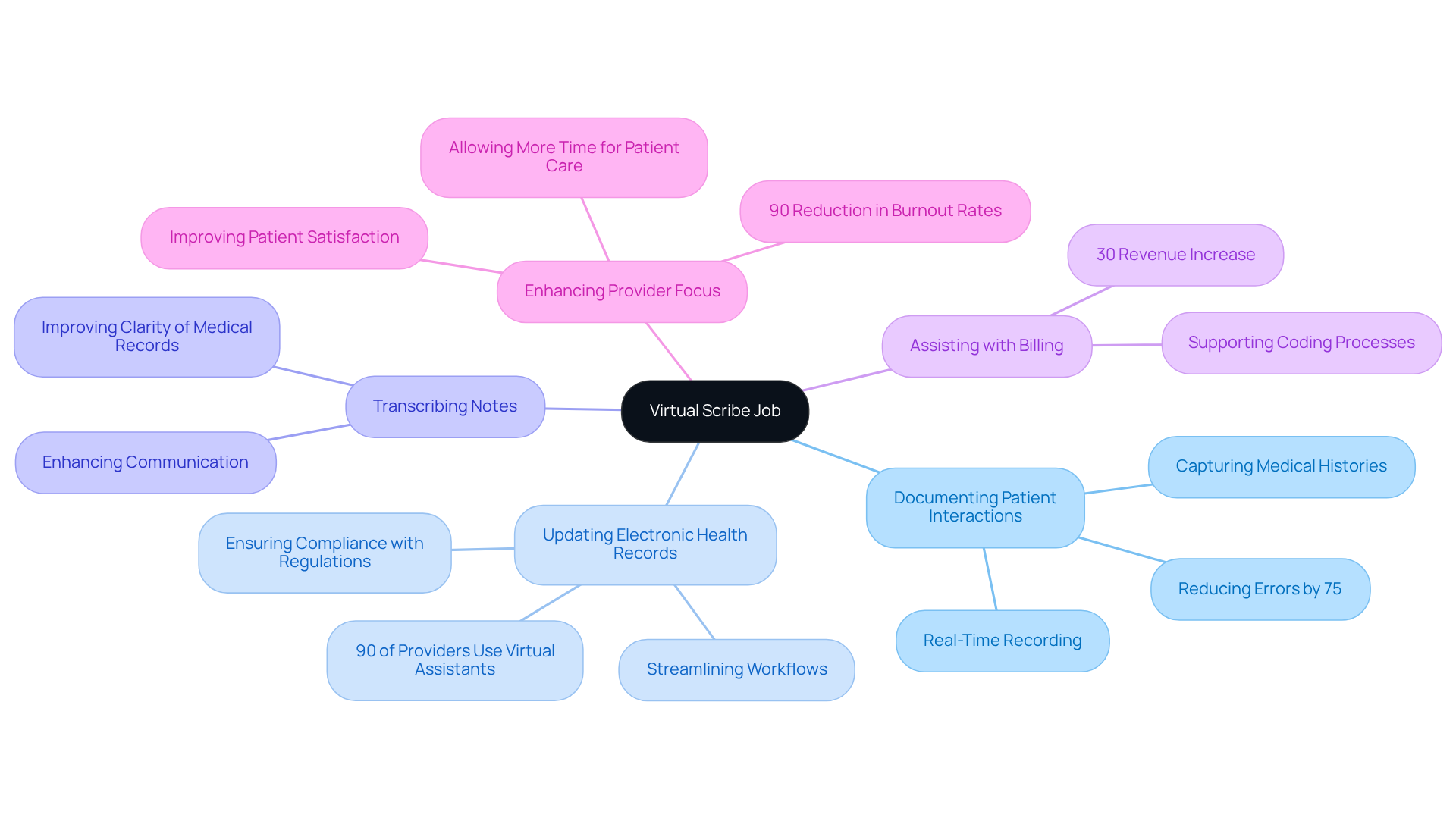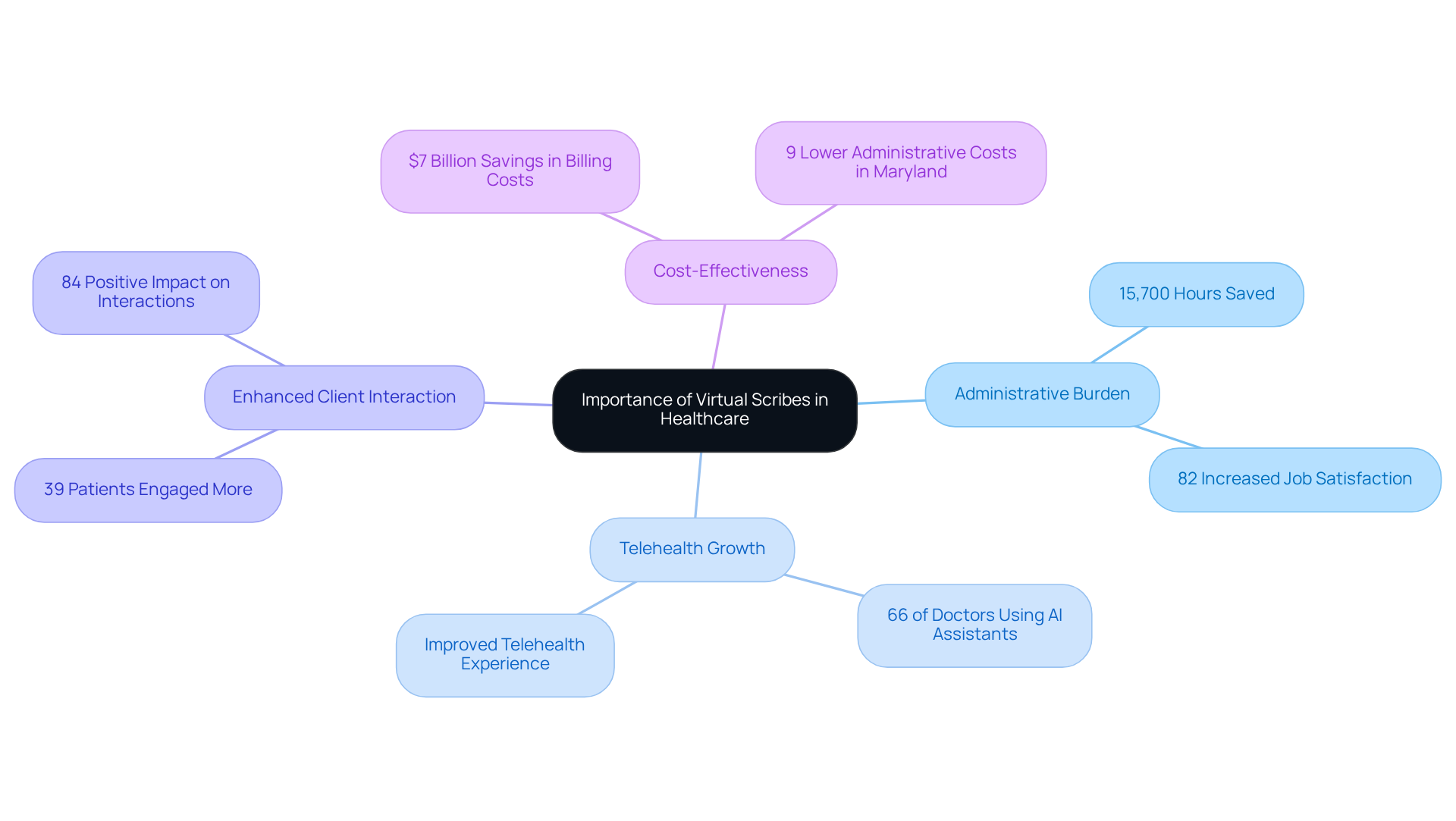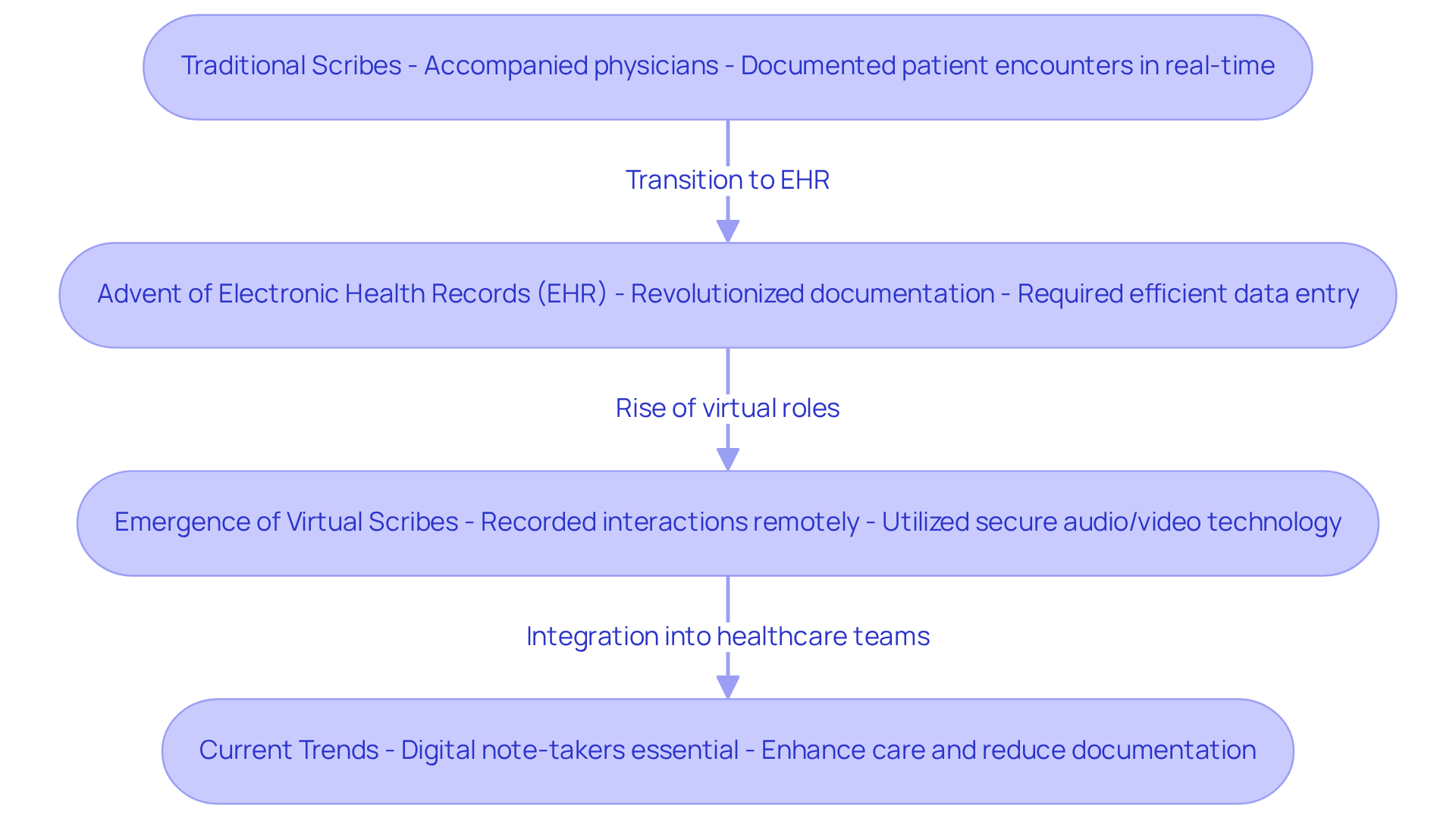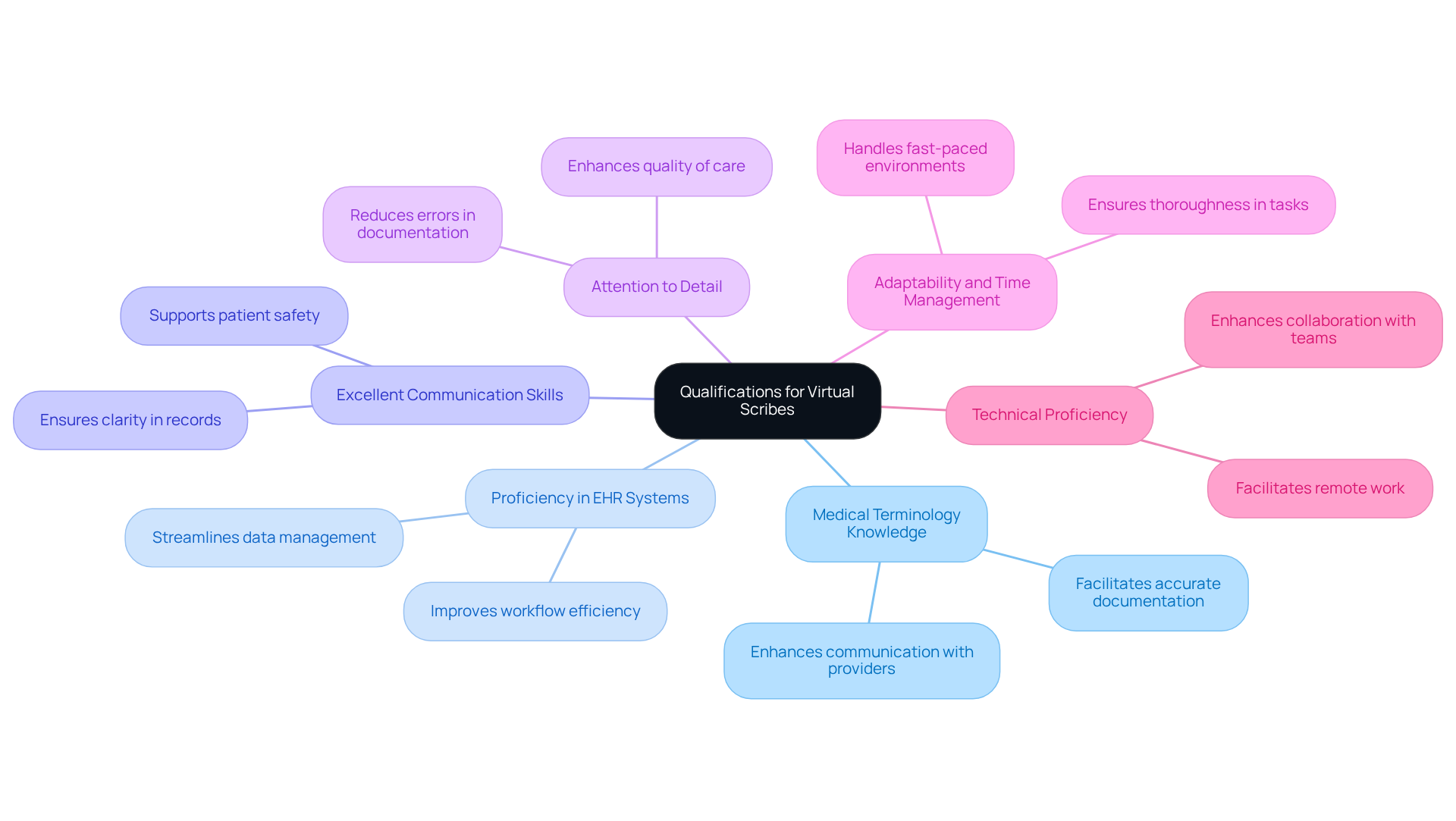Overview
Healthcare providers often face overwhelming emotional challenges due to administrative burdens that detract from their ability to deliver compassionate patient care. The virtual scribe role emerges as a supportive solution, allowing providers to document patient interactions in real-time. This alleviation of administrative tasks not only enhances documentation accuracy but also improves electronic health record management.
By integrating virtual scribes into healthcare settings, we can foster better patient-provider relationships and significantly reduce physician burnout. Imagine how much more fulfilling your role could be when you can focus entirely on your patients, knowing that the documentation is taken care of.
As we explore these solutions, let's consider how they can transform your daily experience in the healthcare field. Virtual scribes are not just a tool; they represent a step toward a more compassionate and effective healthcare environment. Together, we can create a space where healthcare providers can thrive, ultimately leading to better care for patients.
Introduction
In the intricate world of healthcare, where the focus should be on patient care, the burden of administrative tasks often weighs heavily on providers. This reality can lead to feelings of overwhelm and frustration. The emergence of virtual scribes offers a transformative solution, allowing healthcare professionals to reclaim valuable time by delegating documentation responsibilities.
As this role continues to evolve, we must reflect on an important question: How do virtual scribes not only alleviate administrative strain but also enhance the quality of patient interactions and overall healthcare delivery? By embracing this innovative support, healthcare providers can focus more on what truly matters—their patients.
Define Virtual Scribe Job: Key Responsibilities and Functions
In today’s fast-paced healthcare environment, providers often grapple with overwhelming administrative burdens. These challenges can detract from their primary focus: delivering compassionate care to their patients. A virtual scribe job involves an online writer who emerges as a skilled expert, alleviating pressures by recording client interactions in real-time, typically using secure audio or video technology.
Documenting patient interactions is a crucial aspect of the virtual scribe job, where meticulous attention is given to capturing the details of each patient visit, including medical histories, examination findings, and treatment plans. This careful documentation is essential, as studies indicate that real-time recording can reduce errors in medical records by up to 75%. By easing the administrative load, digital assistants empower doctors to dedicate more time to individual care, ultimately enhancing the quality of services provided.
- Updating Electronic Health Records (EHR): Managing and updating client records in EHR systems is a vital responsibility. With 90% of medical providers now employing virtual assistants, the has improved significantly, highlighting the importance of the virtual scribe job in ensuring smooth management of patient information. This technological integration not only streamlines workflows but also reinforces the commitment to quality evaluation in transforming faith-based medical services.
Transcribing notes is a key responsibility of a virtual scribe job, where they also record additional notes and remarks from medical providers, enhancing communication and understanding of patient care. This function elevates the clarity of medical records, which is crucial for effective treatment and fosters stronger relationships between physicians and their clients.
In a virtual scribe job, these professionals may assist with billing by supporting coding processes and ensuring that all necessary documentation is available for accurate billing. This support can lead to a 30% increase in revenue for practices that adopt remote scribing services, further enhancing administrative efficiency in faith-based medical settings.
Enhancing Provider Focus: By managing documentation in a virtual scribe job, remote assistants allow healthcare providers to concentrate more on patient care, enriching the overall experience for those receiving services. This shift not only boosts client satisfaction but also alleviates physician fatigue, with reports indicating a 90% reduction in burnout rates among providers utilizing digital assistants. By harnessing generative AI, these professionals can transform care delivery, addressing the frustrations experienced by both doctors and patients alike.
In conclusion, digital assistants are invaluable in modern medical services. They enhance documentation precision and enable providers to focus on delivering high-quality care, ultimately revolutionizing the approach to healthcare and improving service delivery. How might integrating such support change your practice for the better?

Contextualize the Role: Importance of Virtual Scribes in Healthcare
The role of virtual scribes has become increasingly vital in the healthcare landscape due to several key factors:
- Administrative Burden: Healthcare providers often grapple with overwhelming administrative tasks that detract from their ability to focus on patient care. CosmaNeura's innovative AI solutions, particularly through our Agentic Platform, alleviate this burden by managing documentation. This allows providers to dedicate more time to patient interactions. Studies indicate that physicians utilizing AI assistants reported significant reductions in documentation time, saving an estimated 15,700 hours over a year—equivalent to 1,794 working days. Moreover, 82% of doctors indicated enhanced overall job satisfaction due to the implementation of AI assistants, highlighting the transformative effect of generative AI in improving efficiency and accessibility in healthcare provision.
- Telehealth Growth: The increase of telehealth services has highlighted the significance of online record-keepers in documenting remote client interactions. With 66% of adult and family medicine doctors using regularly, these tools guarantee that care stays efficient and effective, even in online environments. This integration facilitates smooth documentation, improving the overall telehealth experience for both providers and individuals, illustrating how generative AI can enhance care centered around individuals.
- Enhanced Client Interaction: By reducing the time professionals invest in documentation, virtual assistants facilitate more significant engagement with individuals. Reports indicate that 39% of individuals felt their physicians dedicated more time communicating directly with them because of the use of AI assistants, promoting improved relationships and increasing satisfaction. Furthermore, 84% of doctors indicated a beneficial impact of AI assistants on interactions with individuals, demonstrating how these solutions address administrative challenges in medical service delivery.
- Cost-Effectiveness: Employing online assistants can result in considerable financial savings for healthcare practices. By optimizing workflow and reducing the need for in-house administrative staff, practices can redirect resources towards patient care by utilizing a virtual scribe job. The potential for savings is substantial, with estimates suggesting that standardizing payment requirements could save $7 billion in billing costs for clinical services. Additionally, Maryland hospitals have administrative expenses that are 9% lower than the national average, offering a contextual benchmark for the cost-effectiveness of employing digital note-takers.
In summary, while virtual assistants are transforming the medical landscape by streamlining administrative processes, enhancing telehealth services, and improving patient-provider interactions, it is essential to acknowledge the resistance to innovation among physicians. Addressing these concerns is crucial for fostering a more efficient and patient-centered care model.

Trace the Evolution: History and Development of Virtual Scribe Roles
The concept of medical scribing has undergone a remarkable transformation over the years, addressing the emotional challenges faced by healthcare providers.
- Traditional Scribes: Historically, medical scribes accompanied physicians in person, meticulously documenting patient encounters in real-time. This practice, essential for managing extensive medical documentation, has roots that stretch back centuries, reflecting a commitment to patient care.
- Advent of Electronic Health Records (EHR): The early 2000s saw the introduction of EHR systems, revolutionizing the documentation landscape. This shift necessitated more , paving the way for new roles in healthcare that support providers in their mission to care for patients.
- Emergence of Virtual Scribes: As technology advanced and telehealth services gained traction, the virtual scribe job emerged as a significant role. These professionals can now undertake a virtual scribe job to record client interactions remotely, leveraging secure audio and video technology to streamline the documentation process and enhance efficiency. CosmaNeura's intelligent transcription solutions play a crucial role in this evolution, providing medical providers with tools that enhance accuracy and lessen administrative burdens.
- Current Trends: Nowadays, digital note-takers are becoming essential to medical teams, especially as the sector struggles with administrative challenges and aims for enhanced care for individuals. Their capacity to reduce documentation requirements enables service providers to concentrate more on client interactions, ultimately improving the standard of care provided. The integration of AI, including innovative solutions from CosmaNeura, not only improves diagnostics but also automates administrative tasks, complementing human expertise and enhancing overall care delivery.
As we reflect on these advancements, we invite healthcare providers to consider how embracing these tools can alleviate their burdens and foster deeper connections with their patients.

Identify Required Skills: Qualifications for Virtual Scribes
In the demanding world of healthcare, a virtual scribe job is essential. To truly excel, candidates must cultivate a blend of technical and that address both the challenges of the profession and the needs of patients.
- Medical Terminology Knowledge: A robust understanding of medical terminology is essential for accurately documenting patient encounters and facilitating effective communication with healthcare providers. This knowledge not only aids in clarity but also fosters trust within the healthcare team.
- Proficiency in EHR Systems: Familiarity with electronic health record (EHR) systems is crucial for efficiently managing client data and documentation. These systems are integral to modern healthcare practices, enhancing the overall workflow and patient care.
- Excellent Communication Skills: Strong verbal and written communication abilities are vital for remote record keepers. Accurately capturing and conveying information ensures clarity in user records, which is fundamental for patient safety and care.
- Attention to Detail: Accuracy in medical records is paramount; mistakes can have serious consequences for care. Meticulousness is a key trait for successful scribes, contributing to the overall quality of healthcare delivery.
- Adaptability and Time Management: The ability to thrive in fast-paced settings while managing time effectively is crucial. This skill is especially important when handling multiple interactions, ensuring that no detail is overlooked.
- Technical Proficiency: Comfort with technology, including video conferencing tools and documentation software, is necessary for effective remote work. This proficiency enables seamless interactions with medical teams, fostering collaboration and efficiency.
These skills not only enhance the efficiency of healthcare delivery but also contribute to improved patient outcomes. By understanding and addressing the emotional burdens that healthcare providers face, the virtual scribe job plays a valuable role in the evolving landscape of healthcare. Embracing these skills can lead to a more supportive and effective healthcare environment for everyone involved.

Conclusion
The virtual scribe role in healthcare signifies a profound step forward in alleviating the administrative burdens that medical providers often face. By streamlining documentation, virtual scribes empower healthcare professionals to dedicate more time to patient interactions, ultimately enhancing the quality of care. This innovative approach not only reduces the weight of paperwork but also nurtures a more compassionate and patient-centered healthcare environment.
Throughout this article, we have explored various facets of the virtual scribe role, including key responsibilities such as:
- Updating electronic health records
- Transcribing notes
- Assisting with billing
The advantages of employing virtual scribes are clear, with studies revealing significant improvements in documentation accuracy, reduced physician burnout, and heightened patient satisfaction. The transformation of this role from traditional scribes to modern digital assistants underscores the pressing need for adaptability in healthcare practices.
As the healthcare landscape evolves, embracing the role of virtual scribes can catalyze transformative changes in service delivery. By integrating these skilled professionals into medical teams, healthcare providers can enhance operational efficiency and elevate the overall patient experience. Reflect on the potential impact of virtual scribes in your practice and acknowledge their essential contribution to fostering a more effective and compassionate healthcare system.




